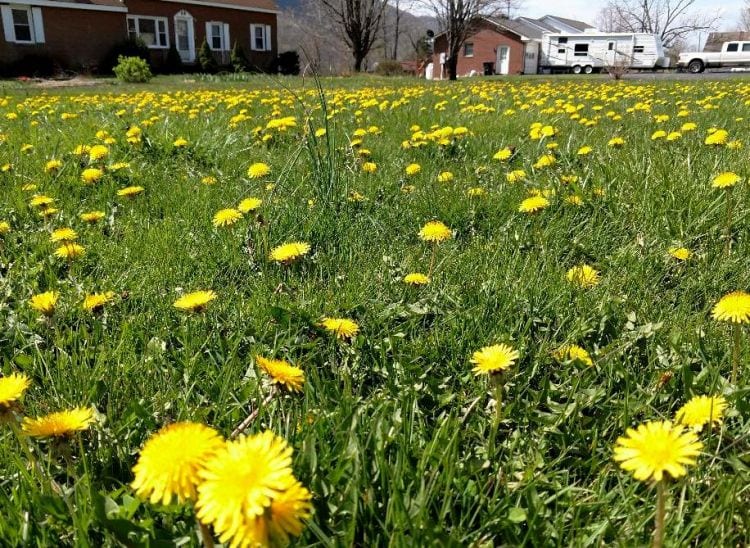
Pam Dudding-Burch
Contributing writer
Many people spend hundreds of dollars year after year buying weed killer in an attempt to get rid of “those pesky Dandelions.” Some even pay professionals to rid their yard of them. The ‘old’ recipes for eating Dandelion flowers and greens, however, are blooming in people’s kitchens again.
Yes, did you know that you can eat your weeds? Many authors, writers and health institutions praise the benefits of this so-called “weed.”
According to writer Leslie Kelly, “They’re delicious and so dang nutritious that they make superfoods look like wimps. The tender leaves can be sautéed like kale, eaten raw in salads or the flowers can be baked into a sunny loaf of bread.”
Grannies favorite is to fry the flowers to make dandelion fritters. The greens can be ground up and made into pestos or other spreads.
There’s even an internet recipe to fry them turned upside down in pancake batter, adding a little honey after they’re done for a deliciously sweet dessert.
Many people are familiar with the making of dandelion wine and medicinal teas. You can also grind the roots for a coffee-like drink or make jellies.
Dandelion retains its health benefits whether consumed raw or cooked and every part – roots, stems, leaves and flowers – is edible.
The Academy of Nutrition and Dietetics (AND) notes that edible dandelion has great benefits as well, being low in calories and packed with vitamins.
Multiple websites agree that Dandelions have potential benefits for some organs and may help keep you healthy and disease-free by providing a number of natural, biologically active compounds, including some called flavonoids and terpenoids.
Dandelion also contains natural antioxidants, compounds that help your body rid itself of free radicals. (Free radicals are unstable molecules made in your body that can damage cell membranes and DNA, potentially speeding aging and raising your risk of cancer and other diseases.)
Published in the Journal of Complementary and Alternative Medicine, a clinical study found that humans who consumed dandelion extract over a 24-hour period produced significantly more urine. In addition, the University of Maryland Medical Center says the diuretic action of dandelion may benefit your liver and circulation by helping lower blood pressure.

Dandelion may also have anti-cancer properties, according to the Memorial Sloan-Kettering Cancer Center, which indicates that it could slow the growth of cancerous tumors and cultured cancer cells, at least in the laboratory. A study published in “Life Sciences” found that cancerous cells cultured with dandelion extract grew more slowly and eventually died, compared to cells grown without the extract.
Here are some additional “Organic Facts” about dandelions found on the internet:
• It helps growth and strength of bones, being rich in calcium.
• It assists liver functioning, having the antioxidants like vitamin C and luteolin and protects it from aging. It also helps treat hemorrhaging in the liver.
• It aids in maintaining the proper flow of bile while stimulating the liver and promoting digestion which can reduce the chances of constipation, which in turn reduces the risk of serious gastrointestinal issues.
• It helps in weight loss. Urine consists of up to 4 percent fat, so the more one urinates; the more water and fats are expelled. Being diuretic in nature, it promotes urination, helping to lose the dreaded “water weight” without causing side effects.
• It is used as sweeteners, being low in calories.
• It helps to detoxify the body.
• It is also good for feminine health, helping to balance hormones.
Health Hub shares their facts about Dandelion:
• It is an excellent food and medicine, a very rich source of beta-carotene which converts into vitamin A. It’s also rich in vitamin C, fiber, potassium, iron, calcium, magnesium, zinc, phosphorus, B complex vitamins, trace minerals, organic sodium and vitamin D.
•It contains more protein than spinach. It’s been eaten for thousands of years as a medicine to treat anemia, scurvy, skin problems, blood disorders and depression.
• It acts as a mild laxative that promotes digestion, stimulates appetite and balances the natural and beneficial bacteria in the intestines.
• This weed-like superfood is a diuretic that helps the kidneys clear out waste, salt and excess water by increasing urine production. This inhibits microbial growth in the urinary system. (Dandelion also replaces potassium lost in the process.)
• It helps regulate blood sugar and insulin levels, through its ability to control lipid levels.
• Studies have shown it lowers and controls cholesterol levels while improving cholesterol ratios by raising HDL.
• It increases bile production and reduces inflammation to help with gallbladder problems and blockages.
• It contains essential fatty acids, antioxidants and phytonutrients that all reduce inflammation throughout the body.
• It boosts immune function and fights off microbes and fungi.
When going on a Dandelion harvest, avoid areas where weed killer might be sprayed. It’s suggested to never pick by a freeway, train tracks or telephone poles.
Dandelion is generally considered safe in food and medicinal levels. However, anyone with allergies should study before consuming.
Craig County resident Vince Caldwell recently put up a post-Facebook that read, “Yum yum, I’m sold on dandelions. That’s what I’ve been telling everyone! However, there’s none in our yard now as we have been eating them all these years and ate the flowers, so they can’t go to seed. Hence, we killed them all out.”
So, the next time your child wants to blow the beautiful little-bloomed dandelion weed ball all over the yard, you can say with a smile, “Go ahead sweetheart, that means we will have more of them to cook for next year.”



